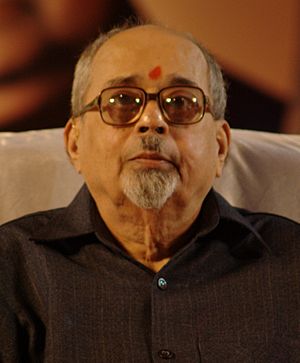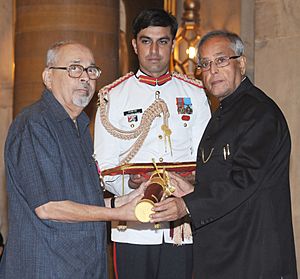Mangesh Padgaonkar facts for kids
Quick facts for kids
Mangesh Keshav Padgaonkar
|
|
|---|---|
 |
|
| Born | 10 March 1929 Vengurla, Sindhudurg District, Maharashtra
|
| Died | 30 December 2015 (aged 86) Mumbai, Maharashtra, India
|
| Nationality | • • |
| Known for | Marathi poetry |
| Awards | Padma Bhushan (2013) Maharashtra Bhushan (2008) Sahitya Academy Award (1980) M.P. Literary Award (1956) Maharashtra State Award (1953-55) |
Mangesh Keshav Padgaonkar (born March 10, 1929 – died December 30, 2015) was a very famous Marathi poet from Maharashtra, India. He wrote many beautiful poems and songs that are still loved today.
Contents
Early Life and Education
Mangesh Padgaonkar was born in a place called Vengurla, in the Sindhudurg district of Maharashtra. This was on March 10, 1929.
He studied at the University of Bombay. There, he earned a Master of Arts degree in both Marathi and Sanskrit. After his studies, he taught Marathi at Matushree Mithibai College in Mumbai for several years. Later, from the 1970s to the 1990s, he worked as an editor at the US Information Service (USIS) in Mumbai. He also spent some time as an assistant editor at the Sadhana (weekly).
A Poet's Journey
Padgaonkar started writing poems when he was just 14 years old! He wrote more than 40 books. Most of these were published by Mouj Prakashan.
His first books were collections of romantic poems. But later, he explored different types of writing. He wrote poems especially for children, and also poems about social and political issues. He even wrote collections of essays and translated books from English and other languages. The US Library of Congress has collected 31 of his books.
One of his important poetry collections was "Salaam." In this book, he used his poems to talk about the problems and corruption he saw in society. For children, he wrote books like "Sutti Eke Sutti." His collection of essays is called "Nimbonichya Zaadamage."
In the 1960s and 1970s, Padgaonkar traveled all over Maharashtra. He recited poetry along with two other famous poets, Vinda Karandikar and Vasant Bapat. He was also part of a Marathi literary group called the "Murgi club." This group included other well-known writers like Gangadhar Gadgil. They met every month to share meals, play word games, and tell literary jokes.
Translator and Lyricist
While working at the USIS, Padgaonkar spent his free time translating books. He first translated American novels, including "Pathfinder" by James Fenimore Cooper. Later, he translated the works of famous Indian poets like Mirabai, Kabir, and Surdas into Marathi.
He also translated plays by the famous English writer William Shakespeare. These included The Tempest, Julius Caesar, and Romeo and Juliet. These translations are so good that they are kept in the Shakespeare Memorial in Stratford-upon-Avon, England. In 2008, his translation of Bible: The New Testament was published. He wrote nearly 20 books of poems just for children.
Padgaonkar also wrote introductions for the books he translated. In these introductions, he shared his thoughts about the original authors and their writing styles. A collection of these introductions is published as "Chintan." His book Shodh Kavitecha talks about his own poems and what others thought of them. He wrote about how his poems came to be and their journey. Another book, "Snehagatha," shares his memories of spending time with other writers.
Besides his poems and translations, Padgaonkar wrote the words for many popular Marathi songs. Songs like "Ya Janmawar, Ya Jaganyawar Shatada Prem Karawe," "Bhatukalichya Khelamadhali," and "Shukratara Mand Wara," sung by Arun Date, are very famous. In 1983–84, he also wrote the theme song for University of Pune, called "Punyamayee De Amha Akshar Vardaan." The famous writer Pu La Deshpande asked him to write this song in just one day!
In 2010, Mangesh Padgaonkar was the president of the 2nd Vishwa Marathi Sahitya Sammelan, a big Marathi literary conference held in Dubai. After his passing, the National Centre for the Performing Arts (India) held a special event to honor his amazing poetry.
Awards and Recognition
Mangesh Padgaonkar received many important awards for his contributions to literature:
- The Sahitya Academy Award in 1980 for his collection of poems Salam. This is one of India's highest literary honors.
- The M.P. Literary Conference Award in 1956.
- The Maharashtra State Award in 1953 and 1955.
- The Maharashtra Bhushan Award in 2008. This is the highest civilian honor given by the Government of Maharashtra.
- "Jeevan Sadhana Gaurav Puraskar" by University of Pune in 2012.
- The Padma Bhushan in 2013. This is the third-highest civilian award in India.
- Maharashtra Sahitya Parishad Puraskar in 2013.
Death
Mangesh Padgaonkar passed away in Mumbai on December 30, 2015, at the age of 86. He had been ill for a short time.
Works
Mangesh Padgaonkar wrote many books, including collections of poems, plays, and other works.
Collections of poems
- Dharanrutya (1950)
- Sharmishtha (1960)
- Kavyadarshan (1962)
- Utsav (1962)
- Salam (1980)
- Gajhala (1981)
- Bhatake Pakshi (1984)
- Tujhe Gita Ganyasathi (1989)
- Bolagani (1990)
- Nava Diwas (1993)
- Sutti Eke Sutti (1993) (Poems for children)
- Jipsi (1994)
- Mira (1995) (Translations of Mirabai's devotional songs)
- Triveni (1999)
- Udasabodh (1996)
- Kabir (1997) (Translations of Kabir's couplets)
- Vatratika (1999)
- Vidushak (1999)
- Moru (1999)
- Phulpakharu Nile NIle
- Suradas (1999) (Translations of Surdas's poems)
- Kavita Manasanchya, Manasasathi (1999)
- Snehagatha
- Radha (2000)
- Dharanrtya
- Ale Megh Bharoon (2010)
- Aphat Rao
- Ase Hote Gandhiji
- Bible: Nava Karar (Translation of The New Testament)
- Chhori
- Bholanath
- Chandomama
- Veda Kokru
- Surdas
- Chintan
- Anand Rhutu
- Sur Anandghan
- Mukhavte
- Kavyadarshan
- Trunparne
- Girki
- Anandache Dohi
- Julius Caesar (Translation of Shakespeare's play)
Plays
- Vadal
Books
- Katharup Mahabharat - Part 1 (Story form of Mahabharata)
- Katharup Mahabharat - Part 2 (Story form of Mahabharata)
- Romeo and Juliet (Translation of Shakespeare's play)
- Kshanika
- Nimbonichya zadamage (Collection of essays)
- Shikshan: Jeevan Rahasya
- Shodh Kavitecha (Discussing his own work)
- Snehgatha (Memories of other authors)
- Sutti Eke Sutti (Children's book)
- Vadhdiwasachi Bhet
- Vede Kokru
- Zule Bai Zula
- Aata Khela Nacha
Anthologies
- Several of his works were translated into English and included in "The Tenth Rasa: An Anthology of Indian Nonsense" (2007).


